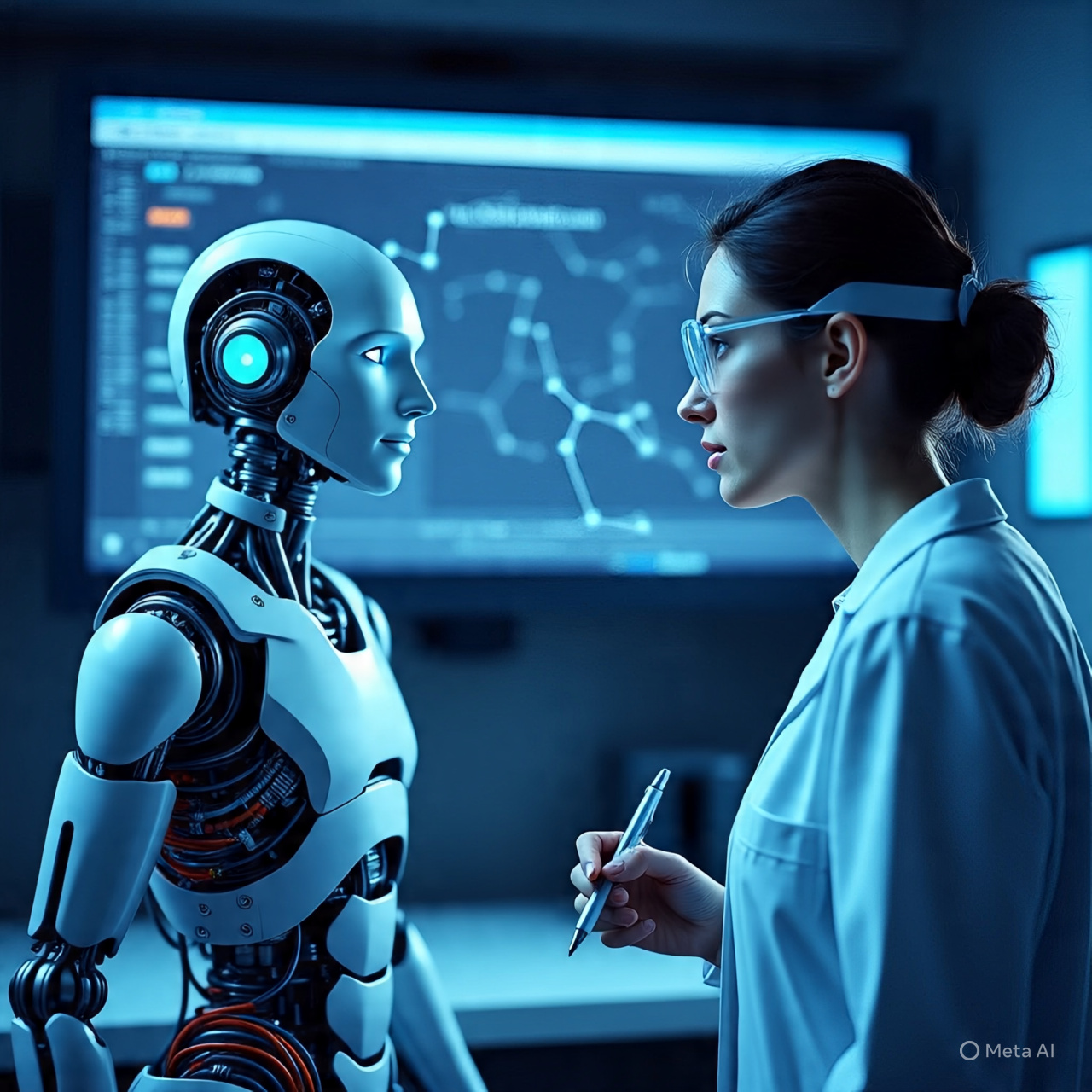Focus Keyword: AI in Healthcare
Introduction: The Dawn of a New Era in Medicine
The healthcare industry is undergoing a massive transformation thanks to artificial intelligence (AI). From early disease detection to robotic surgeries and virtual nursing assistants, AI in healthcare is revolutionizing how patients receive care, how doctors diagnose, and how health systems operate. These breakthroughs aren’t just improving efficiency—they’re saving lives.
In this comprehensive article, we’ll explore the groundbreaking ways AI is reshaping healthcare, highlight the pros and cons, compare leading technologies, and answer frequently asked questions that people are searching online. Whether you’re a tech enthusiast, a medical professional, or simply a curious reader, this deep dive will show how AI is not just the future of healthcare—it’s the present.
Table of Contents
- What is AI in Healthcare?
- Key Breakthroughs That Are Transforming Lives
- AI in Diagnostics
- AI in Imaging and Radiology
- AI in Drug Discovery
- AI in Personalized Medicine
- AI in Surgery
- Virtual Health Assistants
- Predictive Analytics for Disease Prevention
- Pros and Cons of AI in Healthcare
- AI vs Traditional Healthcare: A Comparison
- Real-World Examples of AI Saving Lives
- Challenges and Ethical Concerns
- Future Outlook of AI in Healthcare
- Frequently Asked Questions (FAQs)
- Conclusion
1. What is AI in Healthcare?
AI in healthcare refers to the use of machine learning algorithms, natural language processing, robotics, and data analytics to improve medical care and administrative processes. Unlike traditional software, AI systems can learn from data, adapt to new inputs, and make intelligent decisions—often faster and more accurately than humans.
Examples include:
- AI models predicting cancer risks
- Chatbots handling patient queries
- Robots assisting in complex surgeries
The goal is simple: improve patient outcomes, reduce costs, and save lives.
2. Key Breakthroughs That Are Transforming Lives
AI in Diagnostics
One of the most impactful uses of AI in healthcare is diagnosis. Tools like Google’s DeepMind can analyze medical images with accuracy equal to or greater than human doctors.
- AI can detect diseases like cancer, diabetes, Alzheimer’s, and heart disease earlier than ever.
- For example, IBM Watson can scan millions of medical journals to suggest potential diagnoses.
Impact: Early diagnosis leads to earlier treatment—and a higher chance of survival.
AI in Imaging and Radiology
AI algorithms are transforming radiology by:
- Enhancing X-rays, MRIs, and CT scans
- Detecting small anomalies that human eyes might miss
- Reducing the workload for radiologists
Example: Zebra Medical Vision uses deep learning to identify over 40 medical conditions from imaging data.
AI in Drug Discovery
Traditional drug development can take 10–15 years. AI can shorten that time significantly by:
- Analyzing vast chemical libraries
- Predicting molecule interactions
- Identifying candidates for clinical trials
Case Study: In 2020, an AI-designed drug molecule entered human trials—a global first.
AI in Personalized Medicine
AI can analyze a person’s:
- Genetics
- Lifestyle
- Environment
…to create tailor-made treatments. This precision medicine approach helps:
- Improve treatment outcomes
- Reduce side effects
- Enhance patient satisfaction
AI in Surgery
Robotic surgery powered by AI is making procedures:
- More precise
- Less invasive
- Quicker to recover from
Da Vinci Surgical System is a prime example, enabling microsurgical accuracy that human hands alone can’t match.
Virtual Health Assistants
AI-powered virtual nurses like Sensely help patients:
- Monitor symptoms
- Manage chronic diseases
- Adhere to medication schedules
These digital assistants reduce hospital readmissions and improve patient engagement.
Predictive Analytics for Disease Prevention
By analyzing patient data and medical histories, AI can:
- Forecast epidemics
- Predict patient deterioration
- Help doctors make proactive decisions
Example: AI helped track COVID-19 outbreaks even before official organizations acted.
3. Pros and Cons of AI in Healthcare
| Pros | Cons |
|---|---|
| Faster, more accurate diagnoses | High initial implementation costs |
| Reduces human error | Risk of bias in AI algorithms |
| Enables remote healthcare | Data privacy concerns |
| Streamlines hospital operations | Limited human empathy |
| Personalizes treatments | Reliance on technology |
SEO Tip: Search engines love balanced content—so presenting both pros and cons boosts your article’s trustworthiness.
4. AI vs Traditional Healthcare: A Comparison
| Category | Traditional Healthcare | AI-Powered Healthcare |
|---|---|---|
| Diagnosis Speed | Slower; relies on tests & human analysis | Instant or near-instant via predictive models |
| Accuracy | Subject to human error | High accuracy with machine learning |
| Cost | High long-term costs | Lower over time (automation) |
| Patient Monitoring | Manual, in-person | Real-time via wearables & AI |
| Data Use | Often fragmented | Holistic analysis of big data |
5. Real-World Examples of AI Saving Lives
Breast Cancer Detection
- Google’s AI model outperformed radiologists in identifying breast cancer from mammograms.
Sepsis Prediction
- Johns Hopkins used AI to predict sepsis hours before it occurred, reducing mortality by 20%.
Diabetes Management
- AI tools like GlucoMe help patients monitor glucose levels and recommend personalized adjustments.
Mental Health Support
- Apps like Woebot use NLP to provide real-time emotional support, especially helpful during the pandemic.
6. Challenges and Ethical Concerns
Despite its potential, AI in healthcare is not without controversy.
Key Challenges:
- Bias in Data: AI trained on biased datasets can perpetuate inequality.
- Lack of Transparency: Some AI models are “black boxes” with no clear decision-making path.
- Overreliance on Technology: AI should assist, not replace, medical professionals.
- Patient Privacy: AI needs access to sensitive data, raising ethical concerns.
- Regulatory Hurdles: Global laws on medical AI are still evolving.
7. Future Outlook of AI in Healthcare
The future of AI in healthcare is bright and inevitable.
Upcoming Trends:
- AI + IoT Integration: Wearable tech and AI will provide real-time health updates.
- AI-Driven Telemedicine: Smarter virtual consultations.
- Augmented Reality (AR) in Surgery: With AI guiding every move.
- Global Health Initiatives: AI used in low-income countries for disease management.
According to McKinsey, AI could save the healthcare industry up to $150 billion annually by 2026.
8. Frequently Asked Questions (FAQs)
Q1. What is the biggest benefit of AI in healthcare?
The ability to make faster, more accurate diagnoses—often before symptoms even appear.
Q2. Can AI replace doctors?
No. AI is designed to assist doctors, not replace them. Human judgment remains essential.
Q3. Is AI safe to use in surgeries?
Yes, with proper training and regulation. AI-powered robotic surgeries are already showing better outcomes in many cases.
Q4. How is patient data kept secure?
Secure servers, encryption, and GDPR/HIPAA compliance are key to protecting data.
Q5. Will AI increase or decrease healthcare costs?
Initial setup may be expensive, but over time, AI reduces operational costs and improves efficiency.
9. Conclusion
AI in healthcare is not a distant dream—it’s a present-day reality making life-saving impacts across the globe. From cancer detection and robotic surgery to drug discovery and mental health support, the applications are vast and growing.
Yes, there are challenges. But with responsible innovation, collaboration between tech companies and medical institutions, and strong regulatory frameworks, AI can truly redefine what’s possible in medicine.
If embraced wisely, AI could become the most powerful medical tool of the 21st century—saving lives, improving care, and giving us all a healthier future.
Remember: The best breakthroughs don’t just change technology—they change lives.
Would you like this as a downloadable Google Doc or HTML format for your blog or site? I can also generate meta description and keywords if you’re publishing it online.
2/2




